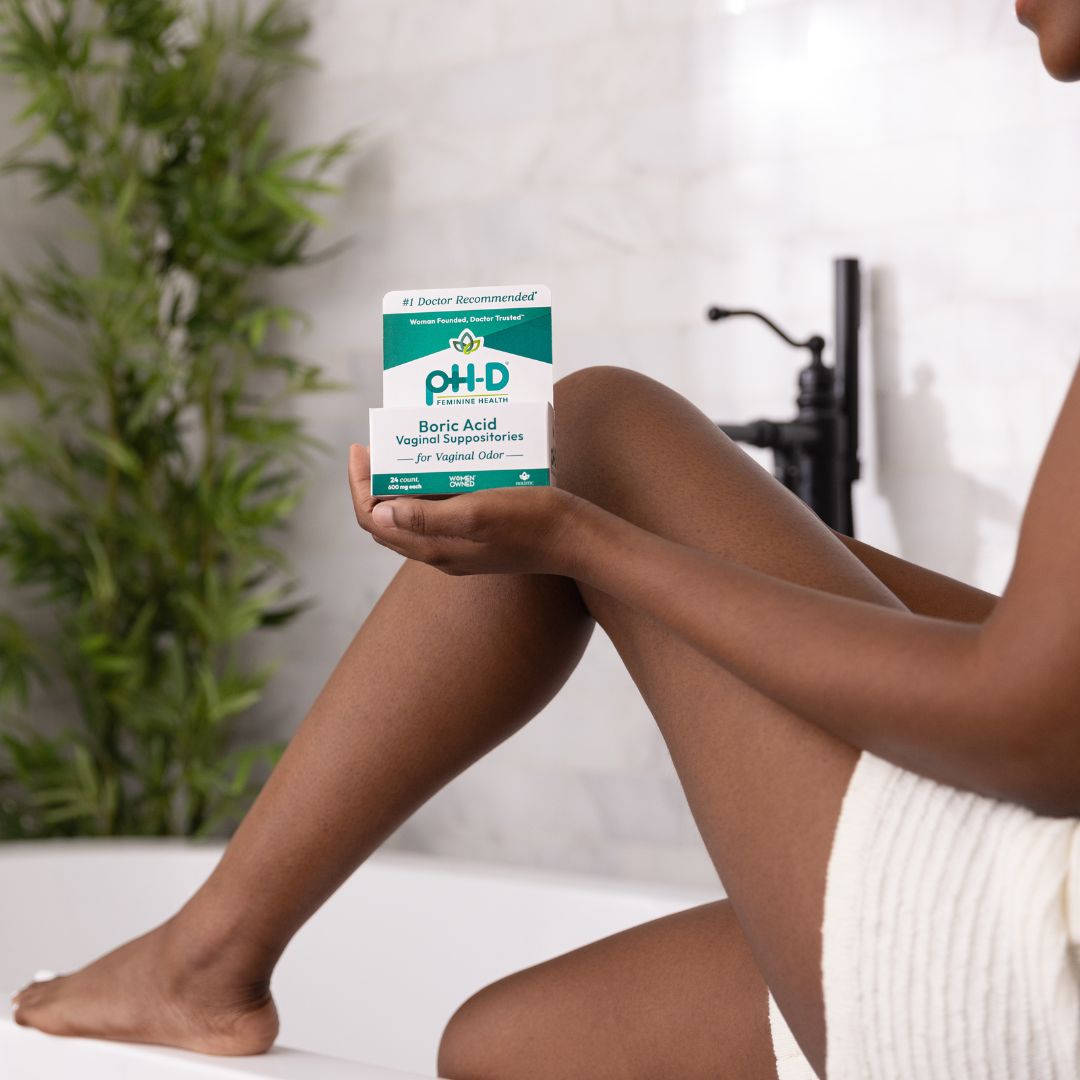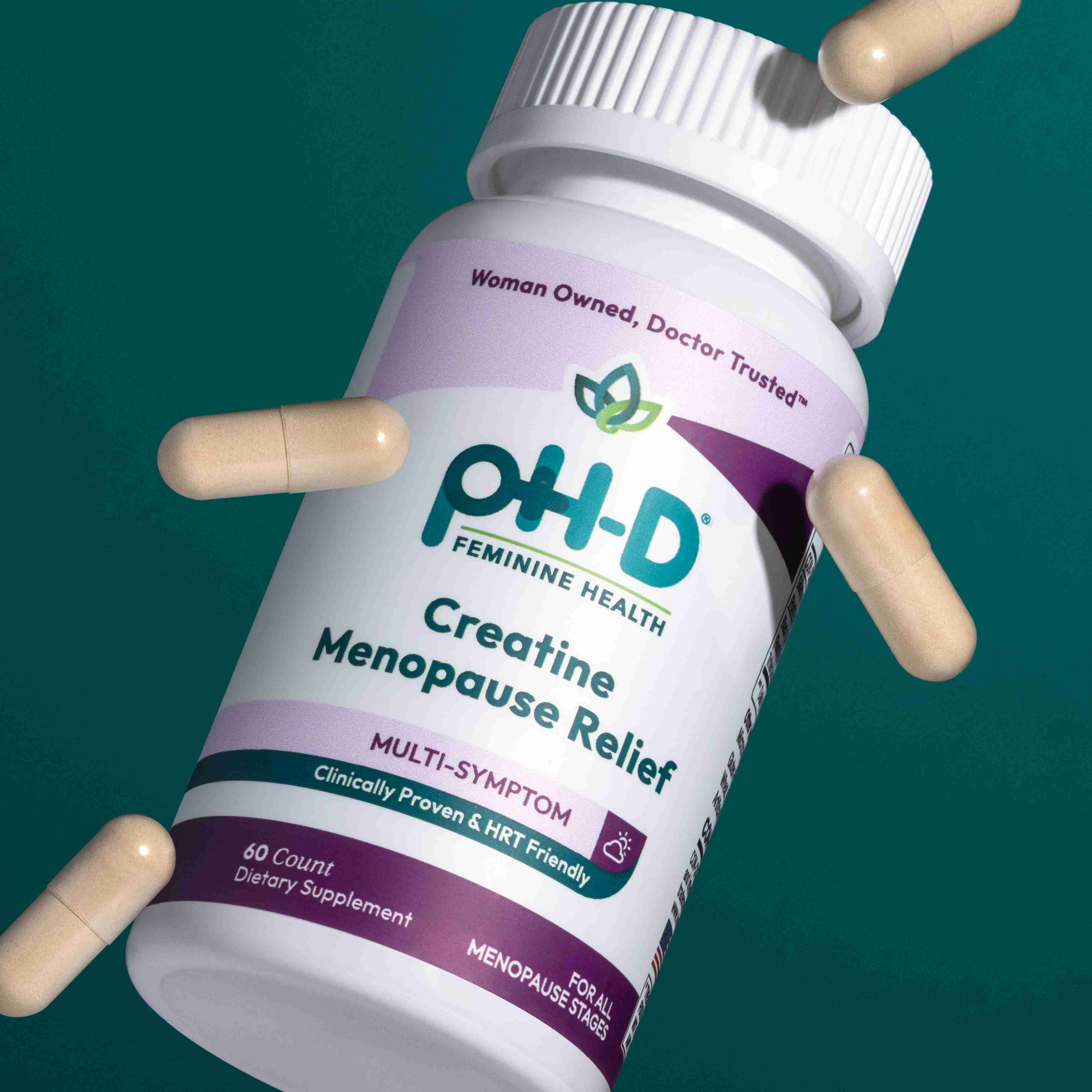Best Foods for Vaginal Health
Key Takeaways
- Certain everyday foods can support vaginal wellness by maintaining balance, hydration, and tissue health.
- What you eat plays a direct role in how your body feels, especially during hormone shifts, stress, or times of dryness or discomfort.
- Small, consistent nutrition choices can be a powerful part of your intimate care routine, alongside the products you already trust.

Let’s be real: your vagina deserves better than being left out of the wellness conversation. Because while you’re meal prepping, sipping greens, or tracking macros, your vaginal health is also along for the ride. And yes, what you eat matters.
At pH-D Feminine Health, we’re all about making feminine care accessible, honest, and free from shame. We’re known for our doctor-recommended boric acid suppositories, but wellness doesn’t start and stop with a capsule. It’s in your daily habits, including what’s on your plate.
So whether you're navigating hormones, managing dryness, or just want to feel your best, you’re in the right place. Let’s dig into the best foods for vaginal health.
Yogurt and Fermented Foods
Your vaginal microbiome is full of good bacteria, and probiotic-rich foods help keep that ecosystem balanced. Yogurt, kefir, kimchi, and sauerkraut are all great sources of live cultures that support your body’s natural bacteria from the inside out.
They can be especially helpful after a round of antibiotics or anytime your body feels a little off. Just be sure your yogurt has “live and active cultures” on the label and skip the ones loaded with added sugar, which can work against those benefits. A simple serving a day can go a long way in supporting your vaginal health.
Leafy Greens
Spinach, kale, Swiss chard, and other leafy greens are loaded with nutrients that help your whole body thrive. For vaginal health, these greens offer antioxidants, magnesium, and vitamins A and C, which support blood flow and tissue strength.
These nutrients help keep the sensitive skin around your vulva healthy and resilient. Magnesium may also help with circulation and stress regulation, which can impact hormones and hydration levels. Add them to smoothies, salads, or stir-fries.
Fatty Fish
Salmon, sardines, and mackerel are great sources of omega-3 fatty acids. These healthy fats support natural moisture and help reduce tension, which can affect how your body feels during hormonal changes.
If you’re experiencing vaginal dryness, especially during menopause or high-stress times, including fatty fish a couple of times a week may offer support. Omega-3s also help maintain the health of cell membranes, which affects elasticity and comfort.
Not a fish fan? Flaxseeds and walnuts are plant-based sources of omega-3s, though they aren't absorbed quite as efficiently. Still, they’re a great option to include.
Berries
Strawberries, blueberries, raspberries, and blackberries are packed with vitamin C and antioxidants. These nutrients help support the collagen in vaginal tissues and protect against cellular damage from stress or environmental toxins.
Vitamin C also supports your immune system, which plays a role in keeping everything in your vaginal environment balanced and functioning properly. They’re sweet, easy to snack on, and mix well into yogurt or oatmeal, making them a simple way to support your vaginal health every day.

Sweet Potatoes
Sweet potatoes are high in beta-carotene, a nutrient your body converts into vitamin A. Vitamin A supports healthy mucous membranes, which are essential for maintaining natural moisture. They also contain antioxidants and fiber, which can support gut health. A healthy gut often translates to better vaginal health, since everything in the body is connected.
Roast them, mash them, or toss them in salads. They’re easy to prep and deliver real benefits without much effort.
Whole Grains
Oats, brown rice, quinoa, and other whole grains do more than keep you full. They also help regulate blood sugar and deliver B vitamins that support hormone balance, energy levels, and overall well-being.
Balanced blood sugar plays a big role in vaginal health. When your glucose levels swing too high or too low, it can throw your hormones off and even impact your body’s natural ability to stay hydrated and comfortable.
Choosing whole grains over refined carbs is an easy switch that supports your vaginal wellness while also helping you feel more energized and steady throughout the day.
Garlic
Garlic may be best known for its bold flavor, but it also contains natural compounds that have been studied for their antibacterial properties. When eaten regularly, garlic may support the body’s ability to maintain a healthy balance of vaginal bacteria.
While it’s not a replacement for medical care or your doctor-trusted pH-D routine, adding garlic to your meals can be a simple, flavorful way to support wellness from the inside out. Raw garlic offers the strongest benefits, but even cooked versions contain many helpful compounds.
Cranberries
Cranberries are known to support urinary tract health, which is closely tied to how comfortable and balanced you feel overall. Their natural compounds may help prevent certain bacteria from sticking to the urinary tract, which is why they’ve earned a spot in many wellness routines.
That’s also why you’ll find cranberry in our Women’s Oral Probiotics. Our daily probiotic supports gut, urinary, and vaginal health in one simple step, with clinically proven ingredients, 4 billion CFU, and cranberry extract to round it out.
Our formula is safe, doctor-trusted, and free of harsh chemicals, because when your wellness routine is working from every angle, you feel it.

Frequently Asked Questions
Do I need to eat all these foods every day?
Not at all. Adding even a few of these regularly can support your wellness. Think progress, not perfection.
What should I avoid eating for vaginal health?
Try to limit excess sugar and ultra-processed foods. They can throw off your body’s natural balance and affect how you feel.
Is cranberry juice enough for urinary health?
Not always. Many juices are packed with sugar. Look for unsweetened versions or try a supplement with cranberry extract, like our Women’s Oral Probiotics.
Conclusion
At pH-D Feminine Health, we believe taking care of your vagina shouldn’t feel mysterious or off-limits. What you eat is part of that care. Whether it’s leafy greens at lunch, yogurt with breakfast, or the simple act of staying hydrated, your daily habits can absolutely support how you feel down there.
Vaginal wellness isn’t about chasing perfection. It’s about giving your body smart, simple support that actually fits your life. And yes, that includes what’s on your plate.
Curious how else you can support your intimate health? Take our quick quiz and put your Vagina iQ to the test. The more you know, the better you can care for what matters.
Sources:
Magnesium and stress - Magnesium in the Central Nervous System | NCBI Bookshelf
Vitamin C and Immune Function | PMC
Brain-Skin Connection: Stress, Inflammation and Skin Aging | PMC


